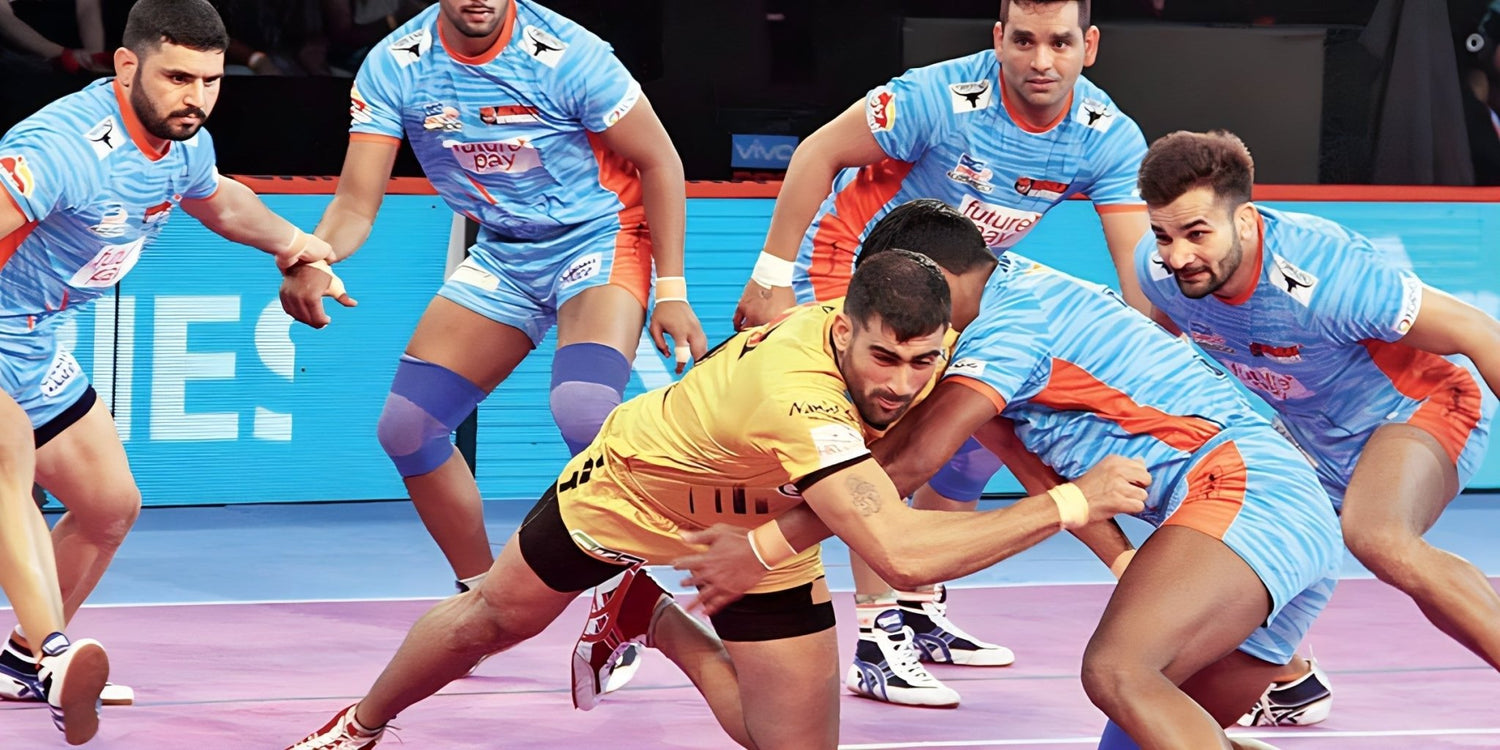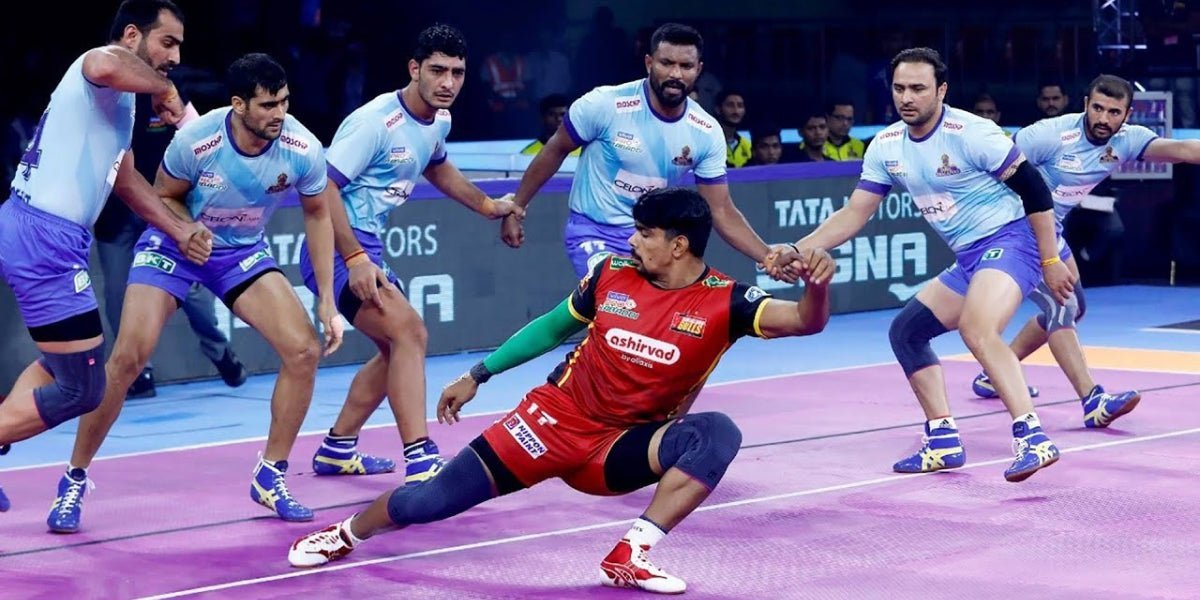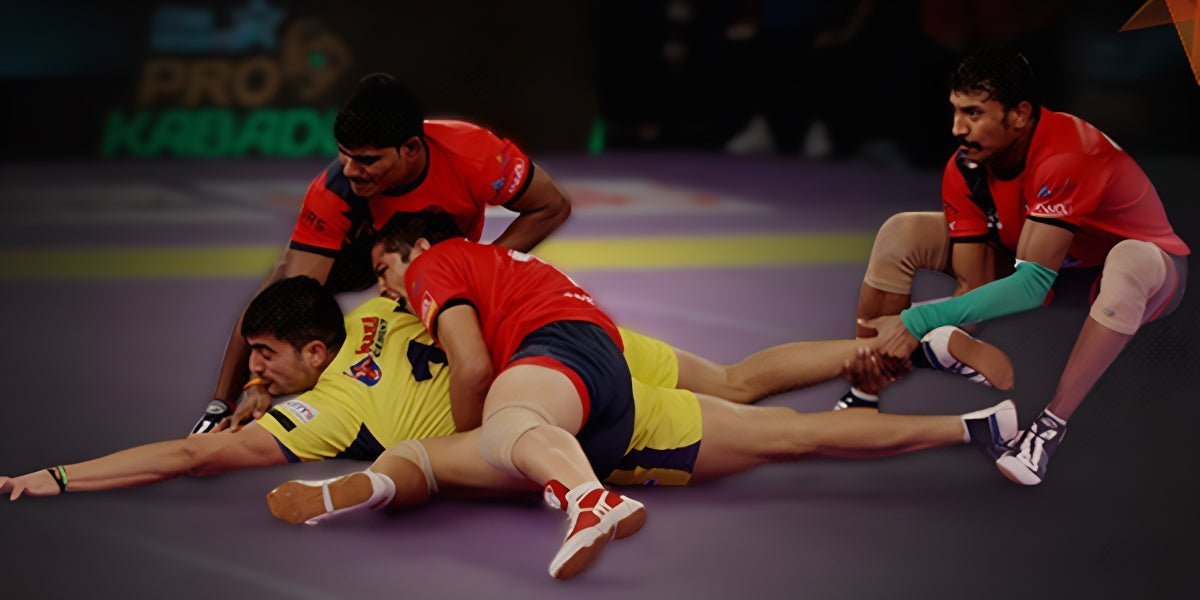To be successful at Kabaddi, athletes should have good levels of strength, speed, and endurance. When kabaddi performance training exercises are included in an individual routine, it leads to better physical and psychiatric abilities. Improved agility and core control are important for fast motion and successful tackles.
Build Power and Agility with Kabaddi Strength Training Exercises
Kabaddi is a fast-paced and intense sport that needs players to be strong, agile, and mentally focused. Adding specific kabaddi strength exercises to the program can improve performance on the mat. This guide will explore essential exercises, agility drills, and core workout elements foundational to a kabaddi player’s training.
Key Components of Kabaddi Strength Training
Kabaddi requires a combination of strength, speed, and stamina. To succeed, players should concentrate on a few key areas :
Strength and Power Development
Strength and power are the foundation of kabaddi training. Explosive power helps with executing strong tackles and quick escapes. Deadlifts and squats are great movements for developing total body strength and power.
Agility and Quickness
Quick reflexes and lateral movement are vital for dodging opponents and performing effective tackles. Agility drills like ladder and cone drills can improve your quickness, helping you stay ahead of defenders on the mat.
Core Stability and Balance
A strong core is essential for maintaining balance and controlling your movements. Core exercises like planks and Russian twists strengthen stability, allowing you to resist tackles and change direction easily during the game.
Endurance and Stamina
Kabaddi requires stamina to last through long, intense matches. Cardiovascular workouts and stamina-boosting supplements will help maintain your energy levels throughout the game and improve overall endurance.
Essential Kabaddi Strength Training Exercises
Strength training exercises are crucial for developing power and resilience. Here is a list of essential exercises:
Squats (Front and Back)

Squats are great exercises for leg hypertrophy, which is essential for quick, powerful movement. Both front and back squats boost lower body strength and core stability, allowing you to move more quickly and efficiently on the mat.
Deadlifts

Deadlifts help build overall body strength, especially targeting the hamstrings, glutes, and lower back. This exercise enhances power and explosiveness, which are essential for tackling opponents and withstanding tackles.
Lunges (Forward and Lateral)

Lunges strengthen the legs, improve balance, and enhance coordination. Forward and lateral lunges are also useful to gain lateral movement, which is essential while performing the dodging action in kabaddi as well as in quick change of direction.
Push Press

The push press targets the shoulder muscles responsible for tackling and defensive movements. It also activates the core muscles, enhancing balance, stability, and endurance of rapid dynamic movements.
Bench Press

The bench press enhances the strength of the chest, shoulders, and triceps. It is also used to simulate the pushing and pulling actions necessary for kabaddi tackles, which are useful for both attacking and defending positions in terms of upper body strength.
Pull-Ups

Pull-ups are effective bodyweight training for exercising and strengthening the upper body. They are also used to train the ability to perform grip strength and upper body force for kabaddi performance.
Benefits of Kabaddi Strength Training Exercises
Adding strength exercises to your program provides numerous advantages that can be directly applied to improve your performance:
Helps Tackle and Raid Strength
Kabaddi strength training exercises improve your ability to tackle opponents effectively and resist tackles. It also develops explosive power for gang attacks, giving you the ability to smash through defenses using force and mastery.
Increases Agility and Balance
Core stability, leg strength, and flexibility exercises boost agility. These exercises prepare you to move quickly and accurately on the mat, which leads to better performance and faster reactions during a game.
Reduces Injury Risk
A strong, well-conditioned body is less prone to damage. Resistance exercise improves muscle resistance, joint integrity, and range of motion thereby decreasing the risk of strains, sprains, and tears during vigorous kabaddi play.
Improves Stamina and Durability
Kabaddi demands sustained energy, and strength training improves stamina. This means players can go on for longer periods, experiencing greater levels of physical exertion without tiring, or suffering a decline in performance.
Kabaddi Agility Drills for Quick Reflexes
Agility enhancement in kabaddi players to be quick on their feet is very significant. Here are some essential agility drills:
Ladder Drills
Ladder drills enhance foot speed, coordination, and agility. Players are trained on how to move their feet fast while keeping their balance, which is essential for successful confrontation evasion in the game.
Cone Drills
Cone drills, e.g., the T-drill, or zig-zag drill, emphasize lateral mobility and fast reactions. They enable players to change directions meanwhile allowing them to manoeuvre away from defenders during a game.
Sprint Drills
Short sprints improve acceleration, explosive speed, quick recovery, and endurance, which are essential during raids or sudden bursts to tackle an opponent and make a quick play.
Shadow Kabaddi Drills
This drill has players mimic movements as if they are in a real game. It is used to enhance timing, reflexes, and footwork so that it is more simple to reproduce realistic game situations during training.
TIPS for Effective Kabaddi Strength Training
To make the most out of your kabaddi strength training exercises, keep these tips in mind:
Following a Balanced Routine
Include a combination of strength, agility, endurance, flexibility, and core exercises to enable a multi-faceted fitness platform that adequately supports all elements of kabaddi training performance.
Tracking Progress and Adjusting Workouts
Monitor your progress and modify your training program according to your level of performance. This allows you to understand your own strengths and weaknesses, allowing you to know how and where to train more steadily.
Incorporating Rest Days
Rest days are very important for muscle fatigue and preventing fatigue. By means of these breaks your body can recover fully, and the next training session will be reached with renewed energy and focus.
Working with a Coach or Trainer
A competent coach can give objective advice in technique, posture, and form, preventing injury and optimizing training advantages. Their experience and guidance can have a significant impact on your overall performance.
Kabaddi is a tough sport that needs strength, agility, and mental focus. A good training routine that includes the right mix of strength exercises, agility drills, and core workouts can make a big difference. By building strength, speed, and endurance, players can improve their performance, lower the risk of injury, and increase their chances of success on the mat.
FAQ
Q1) What are the essential strength training exercises for Kabaddi players?
Key exercises include squats, deadlifts, lunges, push presses, bench presses, and pull-ups. These exercises target strength, power, and stability, which are crucial for kabaddi.
Q2) How can Kabaddi players improve agility?
Agility can be enhanced through ladder drills, cone drills, sprint drills, and shadow kabaddi drills, which focus on foot speed, coordination, and quick reflexes.
Q3) Is core strength important in Kabaddi?
Yes, core strength is essential as it helps with balance, stability, and the ability to resist tackles. Core exercises like planks and Russian twists are highly beneficial.
Q4) What should Kabaddi players include in their workout routine?
A kabaddi workout should include strength training, agility drills, core stability exercises, and endurance training. Rest days and progress tracking are also vital components of an effective routine.










Leave a comment
This site is protected by hCaptcha and the hCaptcha Privacy Policy and Terms of Service apply.